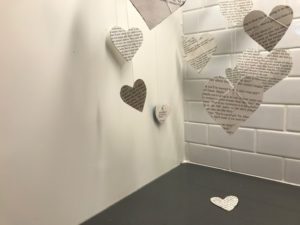 When we open our cottage every year, after its long hibernation, it takes us a little time to bring order and beauty back into our special spot.
When we open our cottage every year, after its long hibernation, it takes us a little time to bring order and beauty back into our special spot.
Dust coats books. Mice have moved in and made themselves at home. It appears they threw a party or two, and sat on my couch. As I wipe and clean and sanitize, I also re-organize. I declutter. Absence has made my eyes sharper so I can see the small table by the window is better over by the green chair. The pot cupboard gets a once-over. We don’t need that wicker basket after all.
As we all cautiously creak open the door of our confinement and tentatively step back out into a changed world, we have a rare gift of opportunity to make a few things new.
I have been thinking about how the pandemic yanked me – by the back of the collar it felt like – from running through my life like a frenzied hare, to an almost dead crawl like the proverbial tortoise, and almost overnight. How shocked I was. And yet, like Aesop taught in that famous fable, the tortoise can actually get some things done, as it turns out. She just does it in a very different way than the leaping, jumping, frenetic rabbit on the run. Things can be slower, and a bit more ordered and thoughtful.
The recent stillness of my life, particularly in the evenings, and my dramatically dwindled circle of companions and utter and complete lack of social engagement with anyone but that circle, has made me question our previous pace.
Who, exactly, have we been racing? And why?
I will try to remember, moving forward, that during COVID-19 I sat on the edge of my bed more than once and looked out my window to watch a neighbour’s cat stroll around the sidewalk like he owned the place, tail swishing.
It was good to sit still and watch a cat be a cat.
I chatted a bit with that particular neighbour, and others, whom I had never spoken with before. I kept hoping for one of those neighbourhood song nights I saw on the news, where you’re lucky enough to live on a street with an entire rock band, or even just a guitar player who entertains from their driveway every night. That didn’t happen. But there was a lot more meeting and greeting and chatting than I have seen before, which makes its own kind of music.
We shared this street and this strange spring, and there is a bond now. We have grown more together because we were so apart. This feels like a gift. As we re-open, let’s keep connecting with our neighbours.
As I walked almost every day, I joined in the strange social sidewalk shunning we all have experienced, cutting wide swaths around other pedestrians, as they swathed around me, so we didn’t break the six-foot bubble.
Sometimes, I even crossed the road to avoid people. Yet, I still hated it when people crossed the road to avoid me.
Last week, I spoke with a man who works with people who live with disabilities. He reminded me this is how some people feel almost all the time, like they are trapped in an isolated bubble which so many people try to avoid, because the avoiders feel so clumsy and uncomfortable, or are just too busy to engage. He named my sin. I have been an avoider. I have crossed the road. I have avoided people of all kinds who I thought might ask too much of me.
Too often, I have kept comfortable and cozy in the bubble in which I didn’t even know I lived. But faith says, do not cross that street. Do not lower those eyes and yes, please open those arms.
Burst that bubble.
As we re-open our homes and our churches, it would be a fine thing to take a moment and consider our bubbles, how permeable or how impenetrable they might be and whether or not we hit the sides of them when we lift our arms up and stretch them out. Are our bubbles too small?
My friend who works with the disabled also told me that he hopes churches don’t go offline now that they have made themselves so accessible online, to so many people who are always housebound and bubble-stuck. Changes that would have taken some congregations years to make happened within weeks when we were forced. Look how flexible we can be when we need to be! This is a good lesson.
Some of us – maybe most of us – have paid some kind of price for all this learning. Wouldn’t it be beautiful to also call this time of great burden a great gift as we slowly re-open and carefully re-order?

A great reflection and challenge. I hope we can retain some of the new ways of being. I’ve never been so enthralled by spring. Somehow in my walks (which I rarely did before Covid) I’ve noticed the budding trees, the blossoms and the gentle coming forth of flowers in ways I never did before. Rather than running through life, I seem to have slowed down to notice. Thanks Karen for putting into words our shared experience.